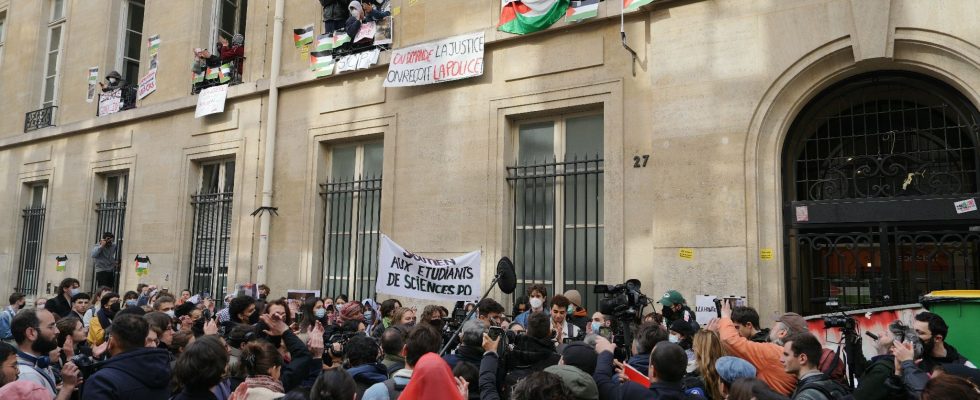If the academic environment is indeed that of knowledge and knowledge, it is easy to realize that Israel represents the only country in the Middle East which applies democracy and allows its citizens, of different origins, to express themselves. However, students from Sciences Po Paris and other prestigious universities, such as Columbia in the United States, today unreservedly support the Palestinian “resistance” by calling for the destruction of Israel.
Freeing yourself from imperialism, revolting against capitalism, with the keffiyeh, the Palestinian flag and songs against Israel, was fashionable in the 1960s among students in the Middle East and elsewhere. During the Algerian War, a wave of student movements engulfed the world, fueled by a strong sense of social justice and anti-imperialism. Same thing with the Vietnam War. University campuses have been the focus of powerful student mobilizations opposed to American military intervention and its foreign policy.
Assimilating the Israeli-Palestinian conflict to a fight similar to that in Algeria or Vietnam awakens particular emotions in today’s students. In their eyes, it is a struggle between the oppressed and the Zionist colonialists, which is part of a long tradition. The photo of Che Guevara in Gaza in 1959 has become iconic. The Popular Front for the Liberation of Palestine (PFLP), a Marxist organization, very quickly entered the academic field. At Damascus University, when protesters invaded campuses following the 1967 war, the PFLP likely played an active role in coordination and mobilization. Created in 1987, Hamas has also invested in universities. During the Second Intifada between 2000 and 2005, students in the Middle East organized large demonstrations supporting the Islamist movement. But the Arab Spring changed the situation: many young people realized that their number one enemy had never been Israel, but the dictatorship that rules their country. This is still the case: we almost no longer find demonstrations for Palestine in universities in Arab countries.
The concealment of Palestinian victims in Syria
On Western campuses, in the 1960s as today, organizers never return to the historical origins of the conflict between Israel and Palestine. The Arab-Israeli War of 1948 took place because the Palestinians refused the UN decision to partition into two states, even though it was the more logical solution rather than continuing a war without end against the Jewish state. The same story repeats itself. Influenced by a victimizing discourse on social networks, Sciences Po students adopted the vision of Hamas by repeating the slogan “From the river to the sea Palestine will be free.” Which means the erasure of Israel. A student at Columbia flew the Hezbollah flag while playing the guitar. The massacre of October 7 is completely hidden in these demonstrations, just like the Palestinians killed in Syria in Bashar al-Assad’s slaughterhouses. Between 2011 and 2022, more than 3,000 Palestinian opponents of the regime were arrested. It is still unclear what happened to most of them, whether they are alive or dead.
Rima Hassan, supporter of the Sciences Po protests, is a good illustration of this manipulation. She grew up in Neyrab, a Palestinian refugee camp on the outskirts of Aleppo (Syria). Until today, 98 of her compatriots, born in this camp, are languishing in the prisons of the fascist regime of Bashar al-Assad without her having addressed a single word of solidarity to them. Among these pro-Palestinian students, we do not talk about the Palestinians of Israel, those who are called the Arabs of 48, accounting for 21% of the Israeli population. We’re not talking about Hamas either, an Islamist movement stemming from the Muslim Brotherhood. The application of Sharia law and the fight against the Jews to liberate the al-Aqsa mosque are an essential part of their project. The students even adopt the casualty figures published by Hamas, as if this fundamentalist movement were a credible reference.
Back to the past
The song Rise Palestine (Long live Palestine), which was circulating on social networks at the start of the war between Israel and Hamas, rattle off words like socialist, imperialism, freedom. It was broadcast during demonstrations in support of Gaza. Its influence, especially among young people, is based on nostalgia for resistance against occupation and a return to a past “better than today”, according to the narrative of the far left in the West. It is forgetting that according to all the data, we live much better in our current era, and this at all levels: health, economy, freedom of expression, tolerance… The students in revolt identify with a glorious past which does not exists only in their thoughts. The danger of this illusion is radicalization and the refusal of divergent opinions. In March, the Palestine committee at Sciences Po banned a Jewish student from appearing in the main amphitheater. On BFMTV, a student defended this discrimination, declaring that demonstrations for Palestine should not accept Jews, just as certain feminist spaces do not accept diversity.
At Columbia University as at Sciences Po Paris, we saw occupations, clashes with the police and slogans repeated over and over. Students for Justice in Palestine (SJP), created in 1993 in the United States, publicly calls for the withdrawal of financial grants from companies linked to the Israeli state and for the end of university programs in Tel Aviv. But, just like the demonstrators at Sciences Po, these activists never mention the complexity of the conflict, the reasons why Israel defends itself against Hamas, the fact that many Palestinians do not support this terrorist movement, the diversity of society Israeli… These demonstrations, which operate exclusively on an emotional mode, only serve for anti-Israeli propaganda.
* Writer and poet born in Damascus, Omar Youssef Souleimane participated in demonstrations against the regime of Bashar al-Assad, but, hunted by the secret services, had to flee Syria in 2012. Refugee in France, he published with Flammarion The Little Terrorist, The Last Syrian, A room in exile, and recently Being French.
.
